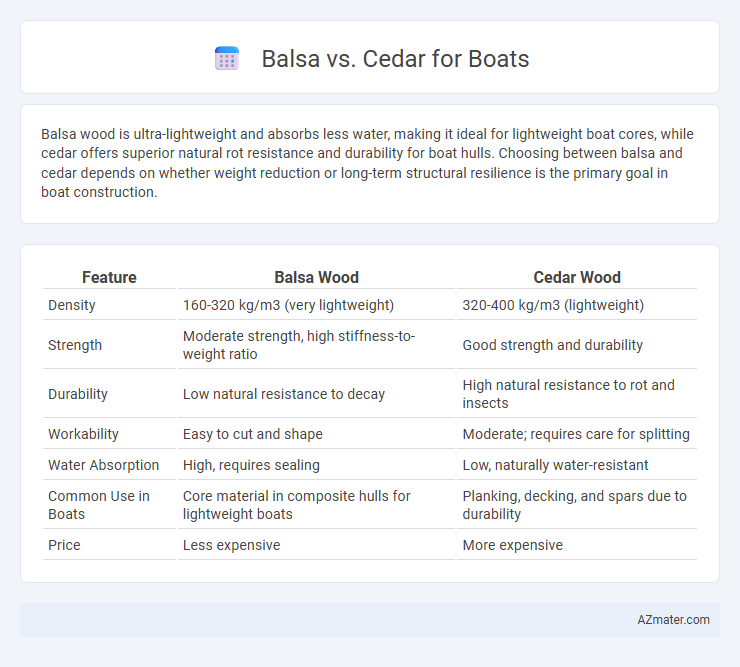Balsa wood is ultra-lightweight and absorbs less water, making it ideal for lightweight boat cores, while cedar offers superior natural rot resistance and durability for boat hulls. Choosing between balsa and cedar depends on whether weight reduction or long-term structural resilience is the primary goal in boat construction.
Table of Comparison
| Feature | Balsa Wood | Cedar Wood |
|---|---|---|
| Density | 160-320 kg/m3 (very lightweight) | 320-400 kg/m3 (lightweight) |
| Strength | Moderate strength, high stiffness-to-weight ratio | Good strength and durability |
| Durability | Low natural resistance to decay | High natural resistance to rot and insects |
| Workability | Easy to cut and shape | Moderate; requires care for splitting |
| Water Absorption | High, requires sealing | Low, naturally water-resistant |
| Common Use in Boats | Core material in composite hulls for lightweight boats | Planking, decking, and spars due to durability |
| Price | Less expensive | More expensive |
Introduction to Balsa and Cedar in Boat Building
Balsa wood, known for its exceptional lightness and buoyancy, is widely used as a core material in composite boat construction, providing excellent stiffness-to-weight ratio while minimizing overall vessel weight. Cedar, particularly Western Red Cedar, offers natural resistance to rot and decay, alongside strong dimensional stability, making it a traditional choice for planking and aesthetic finishes in boat building. Both woods contribute distinct advantages, with balsa enhancing performance through lightweight core applications and cedar providing durability and beauty in structural and exterior components.
Physical Properties Comparison: Balsa vs Cedar
Balsa wood, known for its exceptional lightness with a density ranging from 100 to 200 kg/m3, provides superior buoyancy compared to cedar, which typically has a higher density of 320 to 480 kg/m3. Cedar offers greater natural resistance to rot and decay due to its oil content, making it more durable in marine environments, while balsa's closed-cell structure delivers excellent compressive strength but less moisture resistance. The combination of lightweight balsa cores with cedar veneers is often used in boat building to optimize strength-to-weight ratio and enhance structural performance.
Weight and Buoyancy Differences
Balsa wood is significantly lighter than cedar, with a density ranging from 100 to 200 kg/m3 compared to cedar's 320 to 400 kg/m3, making balsa ideal for weight-sensitive boat building. Balsa's low density contributes to superior buoyancy, allowing vessels to maintain better flotation under varying loads. Cedar, while denser and heavier, offers greater strength but at the cost of added weight, which can reduce overall buoyancy and affect vessel performance.
Strength and Durability Factors
Balsa wood offers exceptional strength-to-weight ratio, making it ideal for lightweight boat construction, but it is less durable and more susceptible to water damage without proper sealing. Cedar, while heavier than balsa, provides superior natural resistance to rot, decay, and insect damage, enhancing long-term durability in marine environments. The choice between balsa and cedar depends on balancing the need for structural strength with the demands of prolonged exposure to moisture and harsh conditions.
Resistance to Rot and Water Damage
Cedar exhibits superior resistance to rot and water damage compared to balsa due to its natural oils and dense grain structure, making it a preferred choice for boat hulls exposed to harsh marine environments. Balsa, while lightweight and buoyant, is more porous and susceptible to water absorption and rot unless properly sealed with resin or epoxy coatings. Effective sealing of balsa is critical to prevent deterioration, whereas cedar's inherent properties provide longer-lasting durability with less maintenance.
Workability and Ease of Shaping
Balsa wood offers exceptional workability due to its lightweight and soft texture, making it easy to cut, sand, and shape for intricate boat components. Cedar, while slightly denser, still provides good ease of shaping with its fine grain and resistance to splitting, ideal for curved or detailed boat parts. Both woods excel in different areas, but balsa's softness makes it the preferred choice for model boats and lightweight structures where precise shaping is crucial.
Cost and Availability of Balsa and Cedar
Balsa wood is generally more affordable than cedar, making it a cost-effective choice for boatbuilding projects requiring lightweight materials. Cedar wood, though pricier, offers greater availability in various grades due to its widespread cultivation and use in boat construction. Both woods are readily accessible, but balsa's lower price and lighter weight often make it preferable for budget-sensitive applications.
Environmental Impact and Sustainability
Balsa wood offers excellent sustainability due to its rapid growth rate and carbon sequestration capabilities, making it a highly renewable resource for boat construction. Cedar, while slower-growing, provides natural resistance to decay and insects, reducing the need for chemical treatments and enhancing its environmental profile. Both woods present eco-friendly alternatives to synthetic materials, but balsa's faster replenishment cycle and low harvesting impact position it as a more sustainable choice for environmentally conscious boat builders.
Common Uses in Boat Construction
Balsa wood is extensively used in boat construction for core materials due to its exceptional lightweight and buoyancy, often found in sandwich panels of hulls and decks to enhance strength without adding significant weight. Cedar is favored for its natural resistance to rot and moisture, commonly utilized in planking and trim, especially in traditional wooden boat building. Both woods contribute to different aspects of boat durability and performance, with balsa excelling in structural core applications and cedar valued for exterior surfaces requiring moisture resilience.
Choosing the Right Wood for Your Boat Project
Balsa and cedar are popular boat-building woods, each offering distinct advantages depending on your project's needs. Balsa is lightweight with excellent buoyancy, ideal for core material in composite hulls, while cedar provides natural rot resistance and strength, making it suitable for planking and structural elements. Selecting between balsa and cedar depends on factors like weight requirements, durability, and exposure to moisture in your boat design.

Infographic: Balsa vs Cedar for Boat
 azmater.com
azmater.com